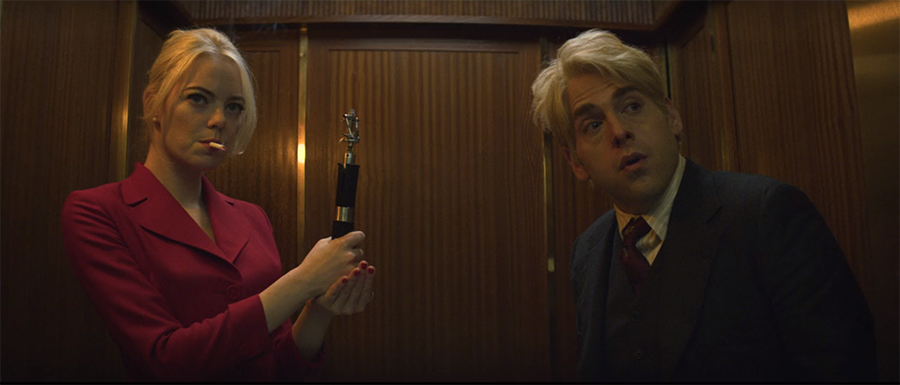The insane success of Netflix’s ‘Maniac’
Inside their minds, test subjects Annie Landsberg and Owen Milgrim experience ridiculous adventures and live many different lives in Netflix’s miniseries “Maniac.” This series was an emotional journey through the themes of mental health, loss, and humankind’s instinctual need for connection.
September 26, 2018
Clear your schedule. Go home. Turn on your phone, or laptop, or TV. Open Netflix. Find the “Netflix Originals” section and begin episode one of “Maniac.” And watch closely, because you are about to witness art.
If you’re still reading this, you’ve failed to listen, but maybe you want to know more before you blindly heed my advice. Allow me to fill you in: Netflix’s new limited series “Maniac” is a magnificent ten-episode drama with a splash of dark humor, a touch of ridiculousness, and a heaping dose of emotion. It was an absolute privilege to experience from start to finish, and it’s undoubtedly one of the greatest shows on this particular multi-billion dollar streaming service.
That’s saying a lot, considering just how much content Netflix likes to produce, but “Maniac” is instantly iconic, meeting and exceeding the quality of Netflix’s other great originals. Watch out “Stranger Things,” “Black Mirror,” and every other miniseries of good repute: “Maniac” is soon to become a household name.

Owen and Annie, back in the real world, sit in the common area with the rest of the test subjects. The time spent in reality is just as important to the series as the time spent in the mind.
“Maniac” features incredible acting performances from Jonah Hill and Emma Stone as the lead characters. Sonoya Mizuno, Justin Theroux, and Sally Field provide the pivotal supporting roles. Cary Joji Fukunaga, director of “Beasts of no Nation” and one of the writers behind the 2017 “It” film, directed the series.
The story is set within an eclectic, futuristic, 80s-inspired world that is fraught with dystopian and sci-fi elements. Artificial intelligence exists alongside 8-bit television while autonomous robots clean the streets. Advertisement’s role in society has reached a terrible peak — friends can be hired. The viewer is thrust into this thematically dark but visually bright reflection of our world to experience an emotional journey like no other.
Jonah Hill plays Owen Milgrim, the black sheep son of a wealthy family. Owen is struggling to cope with schizophrenia and relationship anxiety. Owen has trouble telling what’s real and what’s just a projection of his brain. Emma Stone plays Annie Landsberg, a depressed drug addict tormented by loss.
These characters’ separate lives, which have both been defined by mental illness and struggle, come together when both wind up voluntary patients in a pharmaceutical study. As the two progress through a series of experimental drugs, they embark on several fantastical adventures together, all within the confines of their own minds. Through the process, they must face their own worst moments, inner demons, and fundamental flaws. As the drugs cause their minds to hallucinate entire worlds, a team of slightly moronic scientists and an intelligent supercomputer observe the process, which is designed to help the test subjects overcome their mental illness. It’s a profound, mind-warping experience that manages to speak volumes about the way people connect in such a disconnected world like ours.

The brain activity of each subject is studied as they test a series of experimental drugs. What they experience while on the drugs is dependent upon their own mental state.
The compelling story, which is a psychedelic trip through the beautiful, broken minds of two profound characters, wouldn’t be enough if it was executed poorly. This easily could have been another Netflix original flop. Thanks to the dedication of every actor and actress involved, the musical score, the entrancing color palette of the show, and the occasional moments of humor, “Maniac” was perfect on every single level.
When Owen and Annie are living in some strange mindscape concocted by their connected subconsciousnesses, the characters populating their dream world are actually people they know from real life. Different people with the same faces appear throughout the different dreams. At the same time, many elements of each fantasy are pulled from something that happened to either Owen or Annie before. Viewers with a keen eye will notice these details and appreciate the meticulous care involved in making the show.
With the same faces recurring often, by the show’s end, every major actor or actress has played a large number of drastically different roles. Hill and Stone have to alternate between characters the most. It’s impressive that they both consistently do an amazing job, whether they’re playing a husband and wife, an elf and a gangster, or a magician and a con artist.
The show was a visual feast of colors and light, using the 80s style to its advantage without relying heavily on it to substitute true quality. Darren Lew, the cinematographer for “Maniac,” deserves the same recognition owed to the actors and director. The same goes for Dan Romer, the composer for the show’s distinctive score. Without these two, the tone of “Maniac” could not have been set in stone the way it was.

As Owen and Annie grow closer, they help each other with their respective mental struggles. The friendship they form is an inspiration and a pleasure to witness.
“Maniac” displays character flashbacks in one of two ways: either as actual flashback scene, or by having a character recount an event directly to another character. Despite seeming like the least engaging option, the monologue method works spectacularly, but only because Jonah Hill and Emma Stone are so remarkable at conveying emotion on screen. It’s far worse to hear the heartbreak in a character’s voice than to just watch the sad thing happen.
Not everything is grim, however. Absurd situational comedy is another strength of “Maniac.” Just as the audience is finished reeling from a profound emotional moment, something utterly ridiculous happens to soften the blow. Inside the mind, imagination is the only limit, so comically strange situations are bound to happen.
By emphasizing the value of human connection while telling a beautiful and engaging story, “Maniac” has emerged as one of the most easily watchable and re-watchable shows of the year. Even if it’s crazy, or confusing, or sad, stick with it, and you’ll be glad you did.









